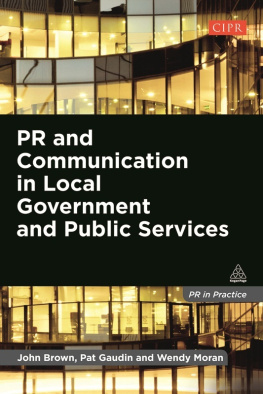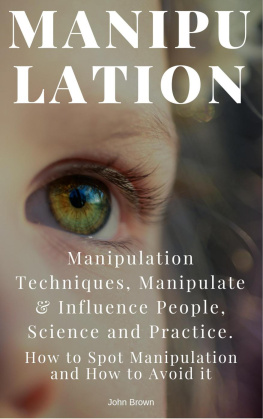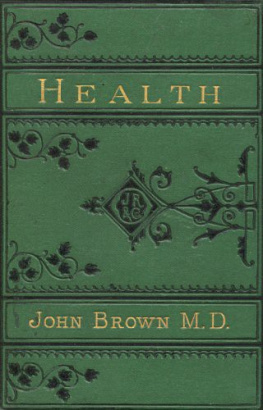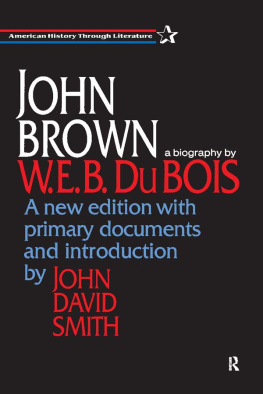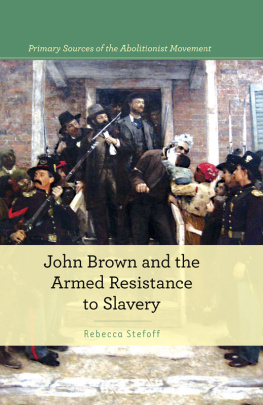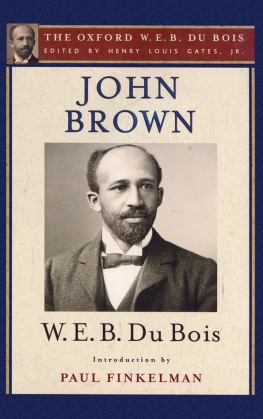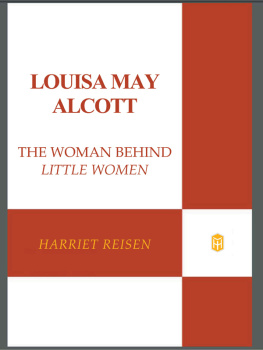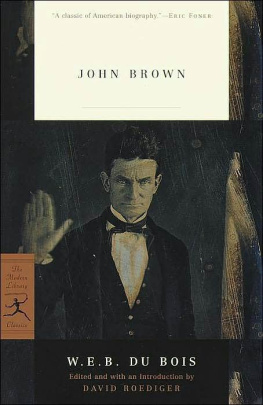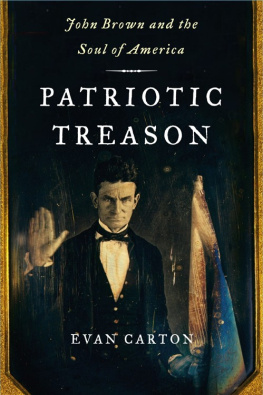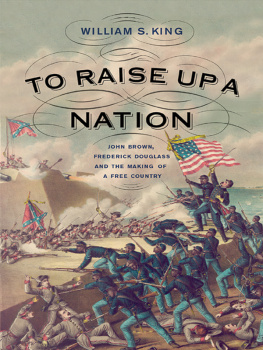John Brown - A John Brown Reader
Here you can read online John Brown - A John Brown Reader full text of the book (entire story) in english for free. Download pdf and epub, get meaning, cover and reviews about this ebook. year: 2021, publisher: Dover Publications, genre: Religion. Description of the work, (preface) as well as reviews are available. Best literature library LitArk.com created for fans of good reading and offers a wide selection of genres:
Romance novel
Science fiction
Adventure
Detective
Science
History
Home and family
Prose
Art
Politics
Computer
Non-fiction
Religion
Business
Children
Humor
Choose a favorite category and find really read worthwhile books. Enjoy immersion in the world of imagination, feel the emotions of the characters or learn something new for yourself, make an fascinating discovery.

- Book:A John Brown Reader
- Author:
- Publisher:Dover Publications
- Genre:
- Year:2021
- Rating:3 / 5
- Favourites:Add to favourites
- Your mark:
- 60
- 1
- 2
- 3
- 4
- 5
A John Brown Reader: summary, description and annotation
We offer to read an annotation, description, summary or preface (depends on what the author of the book "A John Brown Reader" wrote himself). If you haven't found the necessary information about the book — write in the comments, we will try to find it.
A John Brown Reader — read online for free the complete book (whole text) full work
Below is the text of the book, divided by pages. System saving the place of the last page read, allows you to conveniently read the book "A John Brown Reader" online for free, without having to search again every time where you left off. Put a bookmark, and you can go to the page where you finished reading at any time.
Font size:
Interval:
Bookmark:
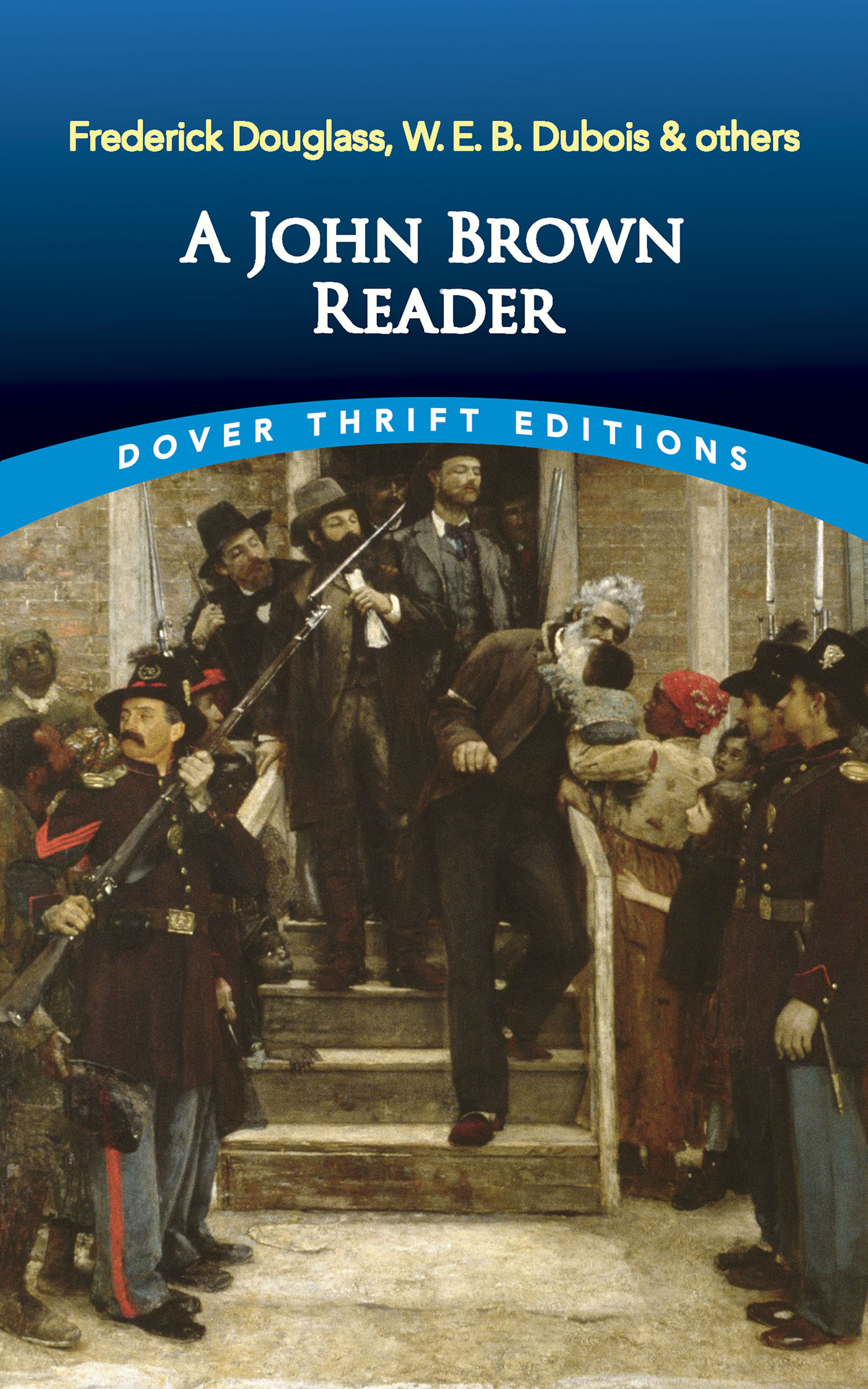
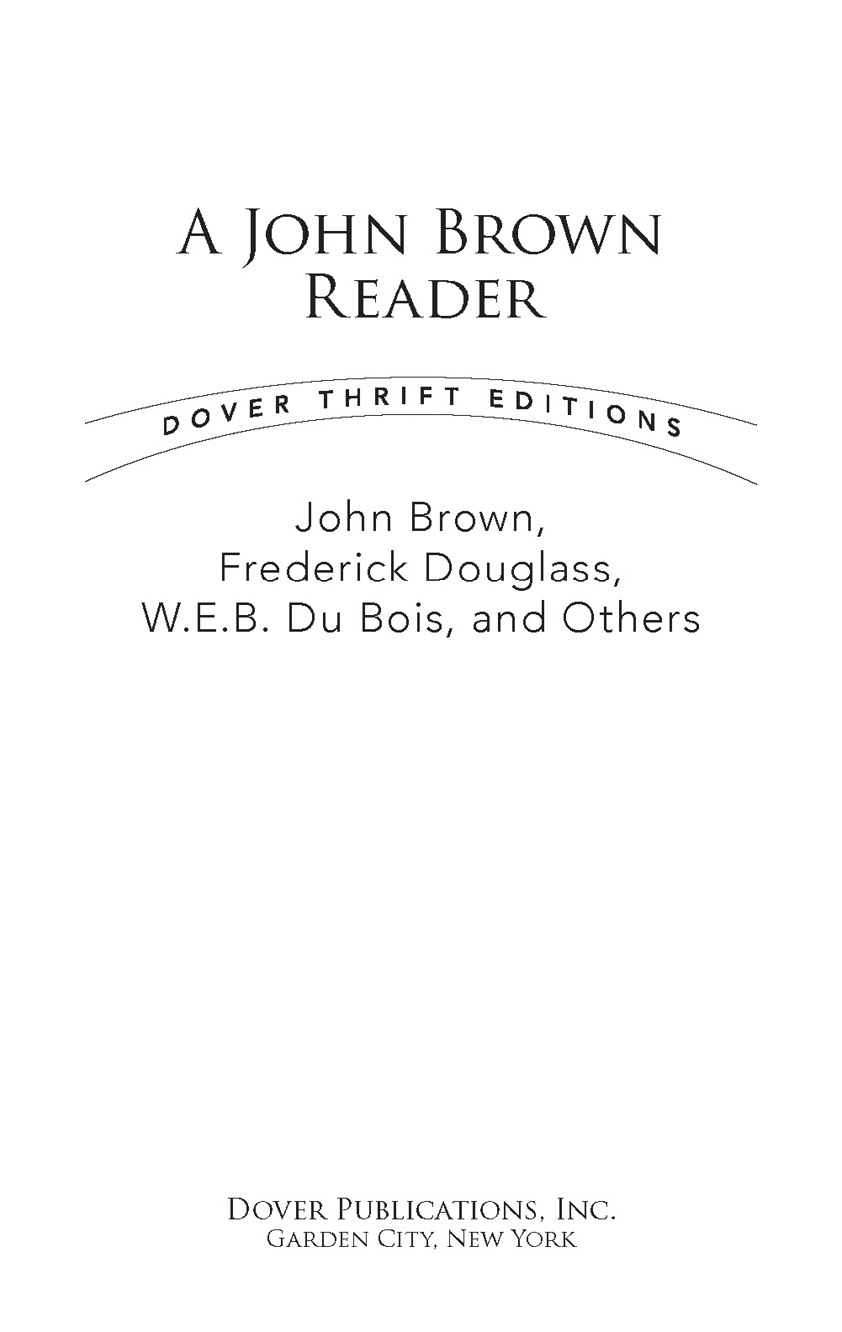
DOVER THRIFT EDITIONS
General Editor: Susan L. Rattiner
Editor of This Volume: Michael Croland
Copyright
Copyright 2021 by Dover Publications, Inc.
All rights reserved.
Bibliographical Note
This Dover edition, first published in 2021, is a new selection reprinted from standard texts. Misspellings, minor inconsistencies, and other style vagaries derive from the original texts and have been retained for the sake of authenticity. A new introductory Note has been specially prepared for this edition. Readers should beforewarned that the text contains racial and cultural references of the era in which it was written and may be deemed offensive by todays standards.
Library of Congress Cataloging-in-Publication Data
Names: Brown, John, 1800-1859, author. | Douglass, Frederick, 1818-1895, author. | Du Bois, W.E.B. (William Edward Burghardt), 1868-1963, author.
Title: A John Brown reader / John Brown, Frederick Douglass, W.E.B. Du Bois, and others.
Description: Dover thrift editions. | Garden City, New York : Dover Publications, Inc., 2021. | Series: Dover thrift editions | Summary: Besides a selection of letters by the abolitionist himself, this original collection includes an excerpt from W.E.B. Du Bois biography, John Brown; addresses by Frederick Douglass and Ralph Waldo Emerson; and poetry by Louisa May AlcottProvided by publisher.
Identifiers: LCCN 2020030833 | ISBN 9780486845623 (trade paperback) Subjects: LCSH: Brown, John, 1800-1859. | Brown, John, 1800-1859 Correspondence.
Classification: LCC E451 .D732 2021 | DDC 973.7/116092dc23
LC record available at https://lccn.loc.gov/2020030833
Manufactured in the United States by LSC Communications
84562101
www.doverpublications.com
2 4 6 8 10 9 7 5 3 1
2020
Note
John Brown was born in 1800 in Connecticut, and he spent most of his childhood in Ohio. His father was a firm opponent of slavery, and the familys home was a safe house for fugitive slaves via the Underground Railroad. At age twelve, Brown saw the beating of an enslaved African American boy, and the experience informed his worldview.
After being ordained as a Congregational minister, Brown worked as a tanner, a sheep drover, a wool merchant, a farmer, and a land speculator, struggling to support his large family. Brown got involved in the abolitionist movement after Presbyterian minister and antislavery activist Elijah P. Lovejoy was murdered in 1837. Brown declared, I consecrate my life to the destruction of slavery!
In 1849, Brown and his family moved to an African American community in Upstate New York, which was funded by abolitionist Gerrit Smith. Brown bought a farm and advised local African American communities.
Whereas many abolitionists were pacifists, Brown became passionate about taking aggressive actions to achieve emancipation and justice for enslaved African Americans.
In 1855, he followed five of his sons to the Kansas Territory in support of antislavery forces. As part of the conflict known as Bleeding Kansas, Brown led antislavery guerillas. After slavery sympathizers plundered Lawrence, Kansas, in 1856, Brown felt that he was on a divine mission for vengeance. He led the Pottawatomie Massacre, in which five proslavery men were killed.
In 1858, Brown worked to establish a stronghold for fugitive slaves in the mountains of Maryland and Virginia. He gained financial backing from Smith and other prominent abolitionists.
In October 1859, Brown led twenty-one abolitionists in a raid on an armory in Harpers Ferry, Virginia (now West Virginia). They took hostages and battled against a militia before surrendering to troops led by Col. Robert E. Lee. Brown hoped that escaped slaves would join his army of emancipation. Although a slave revolt did not come to fruition, he inspired opponents of slavery, and historians view the incident as a dress rehearsal for the Civil War.
Brown was wounded in the raid, and ten of his followers were killed. He was tried for murder, slave insurrection, and treason. On December 2, 1859, he was hanged.
This volume collects definitive documents by and about Brown. Part 1 includes his letters, essays, and speeches, ranging from 1832 to the day of his execution in 1859. Part 2 presents the literary heritage he inspired, with prose and poetry by Victor Hugo, Louisa May Alcott, Herman Melville, Ralph Waldo Emerson, Henry David Thoreau, Frederick Douglass, Carl Sandburg, and Stephen Vincent Benet, beginning with a letter to the editor from Browns death date. Part 3 features several chapters from John Brown , the 1909 biography by W.E.B. Du Bois, an African American civil rights activist, scholar, and author of seventeen books.
Contents
Victor Hugo
Louisa May Alcott
Herman Melville
Ralph Waldo Emerson
Henry David Thoreau
Frederick Douglass
Carl Sandburg
Stephen Vincent Benet
Correspondence of The N.Y. Tribune.
Trading Post, Kansas, Jan., 1859.
The editor of The N.Y. Tribune will greatly oblige a humble friend by allowing me the use of his columns while I briefly state two parallels, in my poor way.
Not one year ago, eleven quiet citizens of this neighborhood, viz: Wm. Calfsetzer [Colpetzer], Wm. Robertson, Amos Hall, Austin Hall, John Campbell, Asa Snyder, Thomas Stilwell, William Hairgrove, Asa Hairgrove, Patrick Ross and B. L. Reed were gathered up from their work and their homes, by an armed force under one Hamilton, and, without trial or opportunity to speak in their own defense, were formed into a line, and all but one shotfive killed and five wounded. One fell unharmed, pretending to be dead. All were left for dead. The only crime charged against them was that of being Free-State men. Now, I inquire, what action has ever, since the occurrence in May last, been taken by either the President of the United States, the Governor of Missouri, the Governor of Kansas, or any of their tools, or by any Pro-Slavery or Administration man, to ferret out and punish the perpetrators of this crime?
Now for the other parallel. On Sunday, the 19th of December, a negro man named Jim, came over to the Osage settlement, from Missouri, and stated that he, together with his wife, two children and one other negro man, were to be sold within a day or two, and begged for help to get away. On Monday, the following night, two small companies were made up to go to Missouri, and forcibly liberate the five slaves, together with other slaves. One of these companies I assumed to direct. We proceeded to the place, surrounded the buildings, liberated the slaves, and also took certain property supposed to belong to the estate. We, however, learned before leaving, that a portion of the articles we had taken belonged to a man living on the plantation as a tenant, and who was supposed to have no interest in the estate. We promptly returned to him all we had taken. We then went to another plantation, where we freed five more slaves, took some property, and two white men. We moved slowly away into the Territory, for some distance, and then sent the white men back, telling them to follow us as soon as they chose to do so. The other company freed one female slave, took some property, and, as I am informed, killed one white man (the master), who fought against the liberation.
Now for a comparison. Eleven persons are forcibly restored to their natural and inalienable rights, with but one man killed, and all Hell is stirred from beneath. It is currently reported that the Governor of Missouri has made a requisition upon the Governor of Kansas for the delivery of all such as were concerned in the last-named dreadful outrage. The Marshal of Kansas is said to be collecting a posse of Missouri (not Kansas) men at West Point, in Missouri, a little town about ten miles distant, to enforce the laws. All Pro-Slavery, conservative Free-State, and doughface men, and Administration tools, are filled with holy horror.
Font size:
Interval:
Bookmark:
Similar books «A John Brown Reader»
Look at similar books to A John Brown Reader. We have selected literature similar in name and meaning in the hope of providing readers with more options to find new, interesting, not yet read works.
Discussion, reviews of the book A John Brown Reader and just readers' own opinions. Leave your comments, write what you think about the work, its meaning or the main characters. Specify what exactly you liked and what you didn't like, and why you think so.

